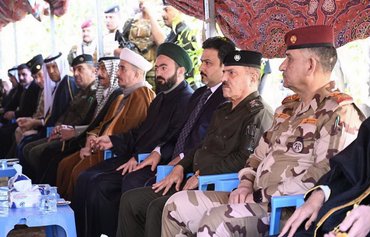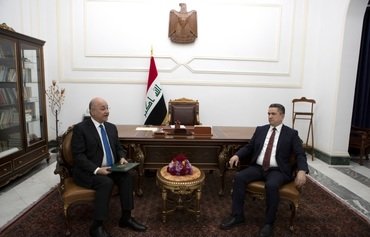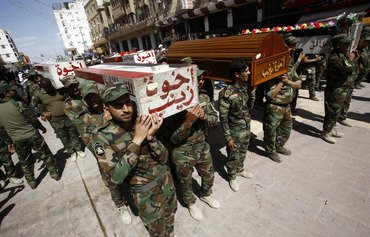With eyes turned to the retaking of Mosul, the last Iraqi stronghold of the "Islamic State of Iraq and the Levant" (ISIL), concern is growing in Iraqi political circles of the increasing influence of armed Iraqi militias allied with Iran.
Lawmakers are worried about the negative repercussions of that influence, especially once the war on ISIL winds down and discussion begins in earnest about how to solidify stability in Iraq and support civil peace.
With thousands enlisted in various militias allied with or directly supported by Iran's Islamic Revolutionary Guard Corps (IRGC), the threat to Iraq's internal security will continue even after the danger from ISIL is gone, they said.
These factions include the Badr Organisation (formerly Badr Brigade), Asa'ib Ahl al-Haq, the Peace Companies, the Iraqi branch of Hizbullah, al-Nujaba, al-Khorasani Brigade and Sayyid al-Shuhada Brigade, in addition to dozens of other small armed formations.
Competing for their leadership are Jamal Jaafar Moahmmed Ali al-Ibrahim (al-Ibrahimi), also known by the alias Abu Mahdi al-Muhandis, and Hadi al-Amiri, also known as Abu Hassan al-Amiri, who leads the Badr Organisation which has historic ties with the Iranian regime.
According to Iraqi MP Mohammed al-Karbouli, who heads al-Hall (The Solution) parliamentary bloc, the danger posed by the growing influence of these factions essentially stems "from their confrontational nature and roguishness".
"These groups fighting ISIL now are in fact in disagreement on many issues," he told Diyaruna, which has the potential to "develop into armed clashes after the curtain is drawn over the final battle with ISIL".
"The other challenge has to do with how we will be able to control and contain the elements of these factions," he added. "There are rogue fighters who only know the language of weapons and fighting and that is a source of great concern, as there can be no stability, rebuilding or progress when some see themselves above the state and do not comply with the law."
"The government should from now on take action to restrict weapons possession to the security forces only and enhance their role, as they are the force that acts against anybody trying to violate the rule of law and order," al-Karbouli said.
He also called on the government to work hard to increase solidarity and social peace among the people of Iraq, as this is "a key factor for securing the country's stability and development".
Heavily armed militias
Militias that are backed by the IRGC or sympathetic to it have light and heavy weapons, including tanks, mortars, surface-to-surface rocket launchers, anti-aircraft missiles and surveillance drones at their disposal.
Furthermore, these militias have an intelligence service, and local media outlets frequently present reports and information about the movements of ISIL gunmen from "unidentified" sources within that service.
According to Iraqi politician and former MP Mustafa al-Hiti, who accuses the Iranian regime of "blatantly and directly interfering in the state of affairs in Iraq", the regime aims to militarise Iraq by arming and training militias.
The media frequently carry images of IRGC commander Qasem Soleimani, with commanders and fighters from militia groups in various areas in the country, al-Hiti told Diyaruna.
"That clearly shows how deep that interference goes," he said. "Iran is today providing arms and training to its affiliated Iraqi armed groups and there is a frightening and continuous effort to militarise the Iraqi people, which threatens the people's solidarity, structure and future."
It is necessary to "curb this Iranian influence and not allow for Iraq to be turned into a scene of bloody disputes between armed groups in their various names and affiliations", al-Hiti said.
"At this time, we need to take all steps needed to arm, equip, and train the army and police forces and encourage young people to enlist and volunteer in the ranks of this official establishment," he said.
Need for a 'clear road map'
Iraqi MP Raad al-Dahlaki of the Ittihad al-Qiwa (Union of Forces) bloc stressed the importance of "developing a clear road map" to avert the dangers of what he described as an "arms chaos" in Iraq.
"We must make decisive decisions," he told Diyaruna. "Once the battle for Mosul is over, we do not want weapons of any kind to remain anywhere and in the hands of anyone."
Having weapons and groups operating outside the state means that Iraq will remain in a spiral of violence and destruction, he added.
"We are about to extinguish ISIL and declare final victory, and once the mission of defeating terrorism is over, we will need exceptional efforts to strengthen the army and Iraqi police forces as the official establishment in charge of the country's security and safety," al-Dahlaki said.
"It is necessary to enhance the unity and independence of Iraqi political decision-making as part of a national vision that avoids any external influences or interference by any regional party," he added.

![Iraqi fighters from the Badr Organisation take part in a training session in the southern city of Basra on April 30, 2015. [Haidar Mohammed Ali/AFP]](/cnmi_di/images/2016/10/18/6369-iraq-badr-brigades-600_384.jpg)







You should never talk about the Iraqi army; it has protected us and defended Iraq.
Reply2 Comment(s)
The legislators have warned against the loss of the chance to steal, not out of keenness for Iraq. I see in Diyaruna a sectarian line. I congratulate you on joining the convoy of sectarianists and politicians.
Reply2 Comment(s)